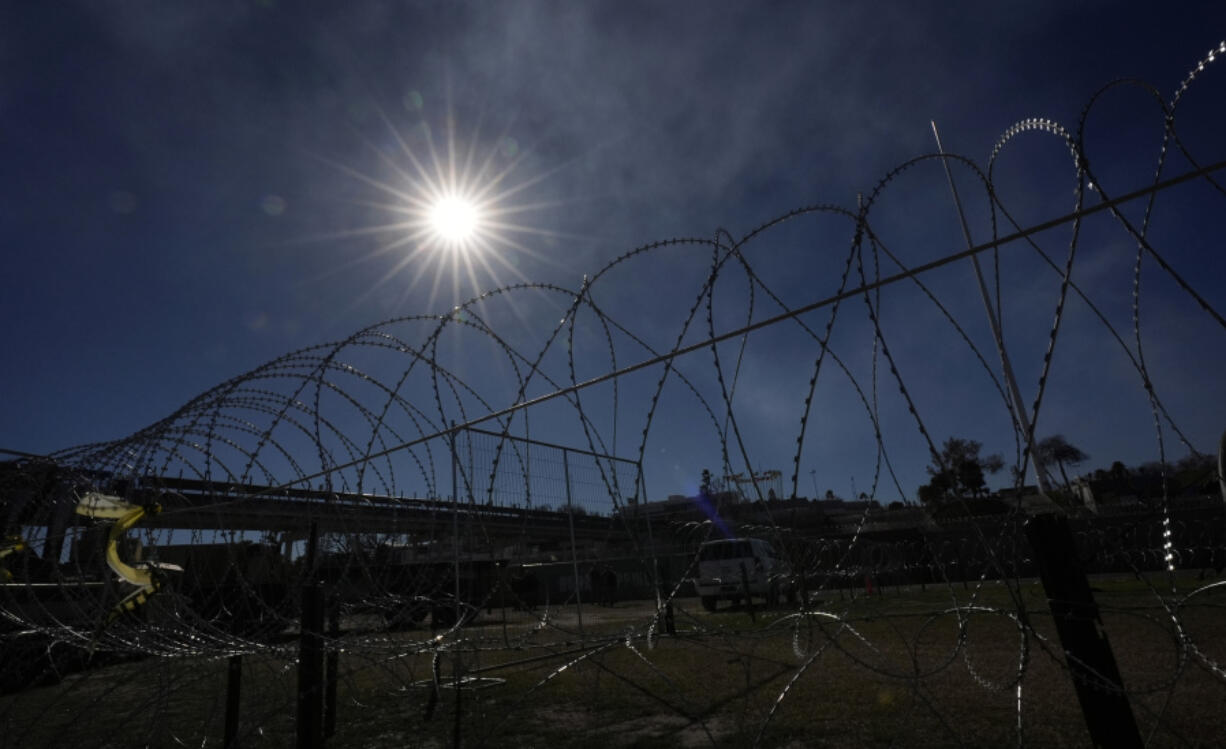The bipartisan Senate border deal announced Sunday night addresses Republican demands for new restrictions on illegal crossings but already has provoked vehement opposition from Donald Trump allies and House GOP leaders.
Immigration is moving to the forefront of voter concerns as the number of undocumented migrants crossing the U.S.-Mexico border surges, repeatedly setting new monthly records under President Joe Biden. In December, border authorities encountered more than 302,000 migrants along the southwest border, more than seven times the 41,000 encounters reported the same month in 2019, just before the global disruptions unleashed by the pandemic.
Some conservative Republicans and media outlets promoted caricatured versions of the emerging pieces of the compromise as it was being assembled. Negotiators in turn hotly disputed those assertions. The release of a bill text now makes clear what the compromise would do.
- Emergency Border Shutdown
Biden would have to immediately close much of the border to asylum-seekers and other migrants using sweeping new emergency authority. U.S. border officials would turn away migrants between official ports of entry, except unaccompanied children and people fleeing torture.
The president would be required to activate the shutdown authority whenever average daily migrant arrivals hit 5,000 for a week or 8,500 on a single day. He would have the option to do so whenever the daily average hits 4,000 for a week.
The border would have effectively been shut down if the bill had been in place during the surge in recent months, per top negotiator Senator Kyrsten Sinema, independent of Arizona. The border would stay shut until migrant arrivals drop to 75% of the trigger point.
U.S. citizens, permanent residents and foreigners with legitimate visas still would be allowed to come into the country at official border entry points even during such an emergency shutdown. Freight traffic also would still be allowed. The shutdown is similar to Title 42 authority used by both Biden and Trump during the pandemic public health emergency, but would carry a stricter penalty for anyone who tries repeat crossings — a one-year ban on seeking legal entry.
Some conservative critics suggested previously the trigger provisions would establish a new loophole welcoming up to 5,000 undocumented migrants into the country each day. In fact, undocumented migrants would remain subject to current enforcement measures, as well as new restrictions imposed in the bill.
- Expedited asylum processing
Migrants not subject to fast-tracked deportation and detention processes would enter a new asylum screening process and be released under government supervision while they make their case. They would get work permits and a decision on their claims within months.
Those whose cases fail would be swiftly deported.
“We end catch and release,” Sinema said.
The idea, Sinema and Republican Senator James Lankford of Oklahoma told reporters, is that a beefed-up and expedited border-processing apparatus will process those migrants quickly — and deport those who do not qualify — without needing to disperse them throughout the country.
Migrants would have to show more evidence to establish they have a “reasonable possibility” of qualifying for protection in the U.S. before they can pursue a case. The standard for a final determination wouldn’t change, just the initial screening threshold. Currently any applicant who shows they have a credible fear of persecution in their home country can pursue a case in U.S. immigration courts, which are clogged with a 3-million-case backlog. That backlog effectively lets migrants stay in the U.S. sometimes for a decade or more while their cases are pending.
Negotiators agreed to more than $20 billion in border security and immigration provisions, including hiring new asylum officers and expanding detention capacity.
“It’s not cheap,” said Democratic Senator Chris Murphy of Connecticut, one of the trio of negotiators, last week.
Speaker Mike Johnson has claimed Biden already has unilateral authority to shut the U.S. border any time he wants. Legal precedents raise doubts.
Federal judges struck down then-President Trump’s attempt to block asylum claims from any migrant who crossed the border between official ports of entry. Lankford said the new authorities and funding require Congress to act.
The bill would also add a combined 50,000 work and family visas a year for the next five years, and protect legal foreign workers’ children from aging out of legal status.
It would also provide a long-sought pathway to permanent residency for Afghan evacuees who fled their country after the U.S. withdrawal there. The bill does not, however, provide a path to citizenship for unauthorized immigrants in the United States, a provision long sought by Democrats.
Soaring border crossings have stirred Republican fury and Democratic anxiety as even northern cities struggle to manage migrant arrivals. Six in 10 swing-state voters say Biden bears responsibility, according to a Bloomberg News/Morning Consult poll.
Republican lawmakers argue that the administration has effectively encouraged migration by renouncing Trump-era border restrictions. House Republicans are preparing to impeach Homeland Security Secretary Alejandro Mayorkas over disagreements with his handling of border policy.
Some Democrats argue Trump and his allies would rather use chaos at the border as a campaign issue. Trump has said the compromise would be a “terrible mistake” and Republicans should only accept a “perfect” border deal.
The border deal is supposed to unlock long-delayed military aid for Ukraine, Israel and Taiwan, and Senate Majority Leader Chuck Schumer plans a test vote on Wednesday.
Senior Senate Republicans, including their leader Mitch McConnell, have said the Senate should move forward with war funding even if the border deal fails. That’s a reversal from GOP attempts to use Ukraine as leverage on the border.
But either Johnson would need to bring the bill up for a House vote or a small number of Republicans could join with Democrats to force a vote through a rarely used parliamentary procedure.



